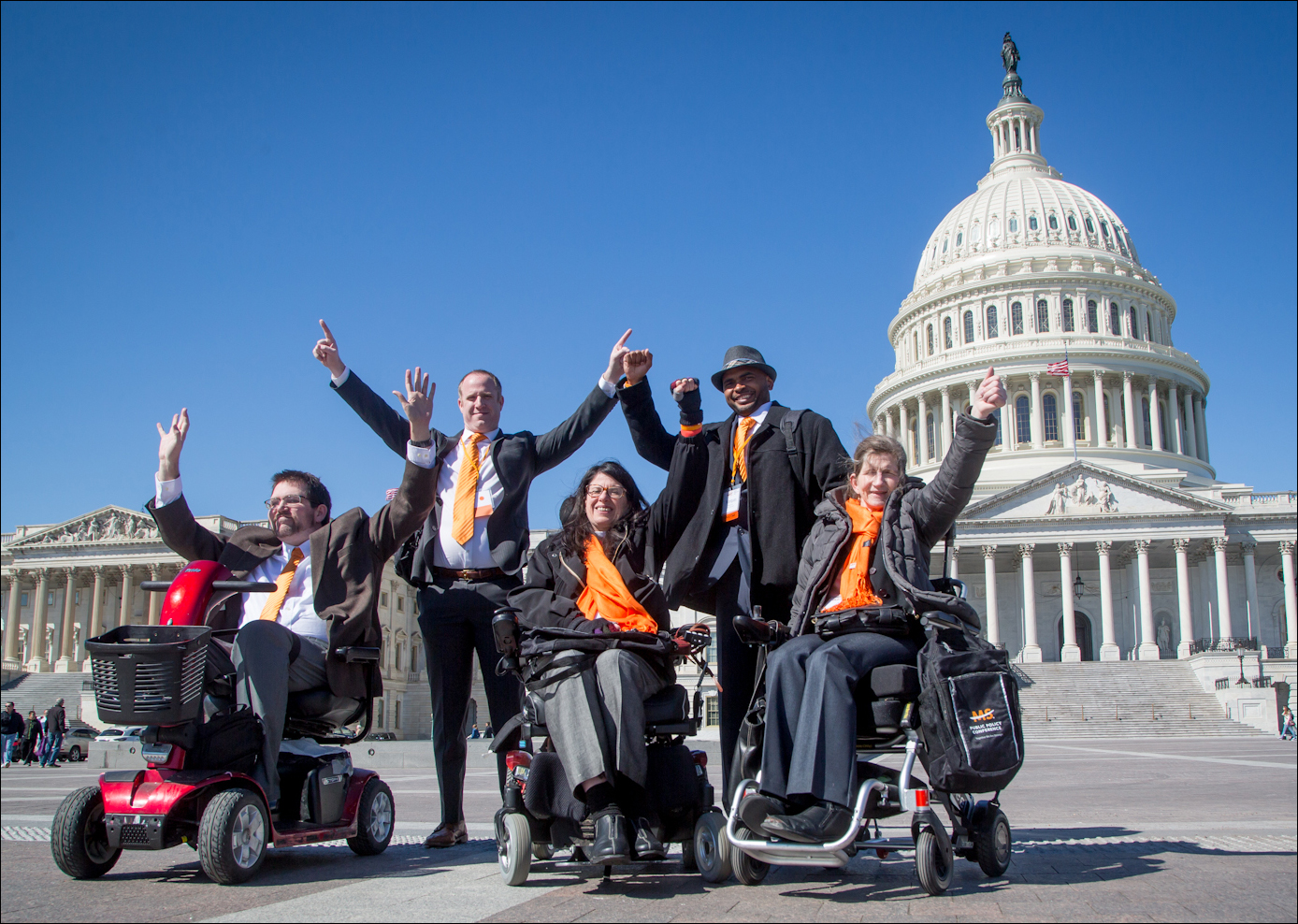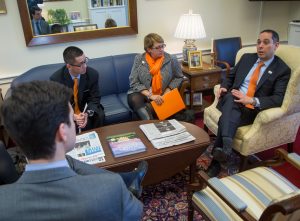National MS Society Urges Lawmakers to Oppose American Health Care Act, Details Why in Interview

MS activists from Virginia visit the U.S. Capitol as part of the National Multiple Sclerosis Society’s Public Policy Conference in Washington, D.C. (Photo credit: NMSS)
Carol Hardaway was diagnosed with multiple sclerosis (MS) in 1990. After years of enduring relapses that brought episodes of complete blindness, numbness, tingling, debilitating fatigue, and short-term memory loss, the longtime resident of Texas — a state which offers Medicaid only to specific categories like low-income families, pregnant women, and the completely disabled — relocated to Maryland, where she signed up to Medicaid within two weeks.
“I was able to see a neurologist for care and start on an MS disease-modifying therapy, for which I pay $3 a month,” Hardaway said, according to a fact sheet from the National MS Society on Health Coverage. “Without Medicaid, this treatment would be $6,000 a month out-of-pocket. As a substitute teacher making $260 every two weeks, that is unattainable.”
Likewise, when Courtney Eiterich of Lenexa, Kansas, was diagnosed 10 years ago, she had a full-time job and healthcare benefits. But as Eiterich’s MS worsened, she was forced to change employment; her best option was to accept group coverage at $2,300 a month for a family of five.

From left, MS activists Austin Chen of East Brunswick, N.J.; Lisa Gallipoli, chapter president of New Jersey Metro, and Douglas Landsman, a staffer at the National MS Society, meet with Robert Butora (back to camera), senior health policy advisor for Rep. Leonard Lance (R-N.J.) during the society’s 2017 Public Policy Conference in Washington, D.C. (Photo credit: NMSS)
Passage of the Affordable Care Act (ACA, also known as Obamacare) in 2010 meant she could no longer be denied health insurance or charged more for a pre-existing condition. The ACA also gave her newer, cheaper options for coverage through the Kansas marketplace, and her family’s premiums eventually dropped to $925 a month, the MS Society reports.
Now, as Congress debates whether to replace Obamacare with the White House-supported American Health Care Act (AHCA), Eiterich says she’s frightened.
“As someone with a chronic, complex disease, I fear being put back in the place where I can’t afford coverage. While my disease is unpredictable, I need my healthcare to be reliable,” she said, urging lawmakers to “not take us backwards.”
Eiterich was among 275 activists who descended on Washington, D.C., for this week’s 2017 Public Policy Conference of the National Multiple Sclerosis Society (NMSS).
Bari Talente, executive vice president of advocacy at NMSS, said her nonprofit advocacy group arranged about 340 visits to lawmakers on Capitol Hill. The fact that the March 20–22 conference took place just as the House of Representatives was debating whether to overhaul Obamacare was coincidental, she said.
“We always knew that this year, healthcare was going to be a big topic — whether it was improvements to the ACA or whatever repeal-and-replace efforts would be,” she told Multiple Sclerosis News Today in a phone interview from Washington. “But the legislation we’ve been seeing this week is pretty troubling for the MS community.”
The House is expected to vote Friday on the AHCA, though its passage is far from certain. Despite the Trump’s administration’s support of the legislation, virtually all Democrats oppose it, as do many conservative Republicans on the grounds that it doesn’t go far enough in eliminating what are labeled “essential health benefits” that insurance plans must cover under Obamacare. Conservative leaders like Rep. Mark Meadows of North Carolina, chair of the House Freedom Caucus, argue that repeal of such benefits is necessary to lower insurance premiums.
The NMSS is fighting the AHCA mainly because it would shift more of the cost of coverage and care to individuals, families, and state governments.

MS activists from Virginia visit the U.S. Capitol as part of the National Multiple Sclerosis Society’s Public Policy Conference in Washington, D.C. From left: Michael Olex of Ashland; Traylor Grayson of Henrico; Karen Jackson of Alexandria; Marques Jones of Henrico, and Anne Rader of Arlington. (Photo credit: NMSS)
“Republicans have been working hard over the last two weeks to compile this package of legislation, and a number of Republicans are confident this is going to pass,” Talente said. “Over the last 24 hours, we’ve actually seen the package get worse.”
According to revised Congressional Budget Office (CBO) projections, 24 million Americans could lose their health insurance by 2026 if the AHCA becomes law. And phasing out Medicaid expansion and imposing a per-capita cap on Medicaid would reduce federal funding to states by an estimated $370 billion over the next decade, the Society notes in its fact sheet.
“There are provisions that tax credits to purchase insurance plans would be based on age and not income, so the older a person is, the higher the tax credit available would be,” Talente said. “We’re concerned about that, because with people being diagnosed with MS as teenagers or at 20 or 40, they really need to have access to quality health insurance plans upon diagnosis.”
The high-risk pools and health savings accounts (HSAs) envisioned by AHCA are also of concern, based past experience with these “non-traditional approaches to health insurance,” the Society states. Specifically, its fact sheet notes that “HSAs are best suited for healthy individuals with high incomes and are often not helpful to people with MS who have complex needs and high cost conditions,” and that high-risk pools “often had waiting lists, premiums that were 150-200% of standard rates for healthy individuals, high deductibles, limited benefits and lack of access to needed specialists.”
The NMSS represents the hundreds of thousands of Americans with MS (an estimated 2.3 million people worldwide have the disease).
To make their voices heard on Capitol Hill, said Talente, “we work with a lot of other organizations, so there are many groups speaking with similar messages. And we emphasize sharing real people’s experiences with members of Congress and their staff.”
One example of that bipartisan support is the Congressional MS Caucus, which includes 130 House members and is co-chaired by Rep. Michael Burgess, a Texas Republican, and Rep. David Price, a Democrat from North Carolina. Sen. Robert Casey, a Pennsylvania Democrat, heads that caucus in the Senate.
For now, said Talente, the biggest expense borne by MS patients is their disease-modifying therapy. How much individuals pay varies greatly, she said. Some people have only a $60 co-pay, while others shell out 40 percent of total healthcare expenses.
“Right now, what is still currently protected in the Affordable Care Act is a cap on annual out-of-pocket costs” — an important consideration given that medications to control MS cost as much as $90,000 a year, she said. “Drug prices are very high and we have seen an upward trajectory. It’s not just new innovative treatments coming to the market. Treatments that have been on the market for 20 years are also very expensive.”






